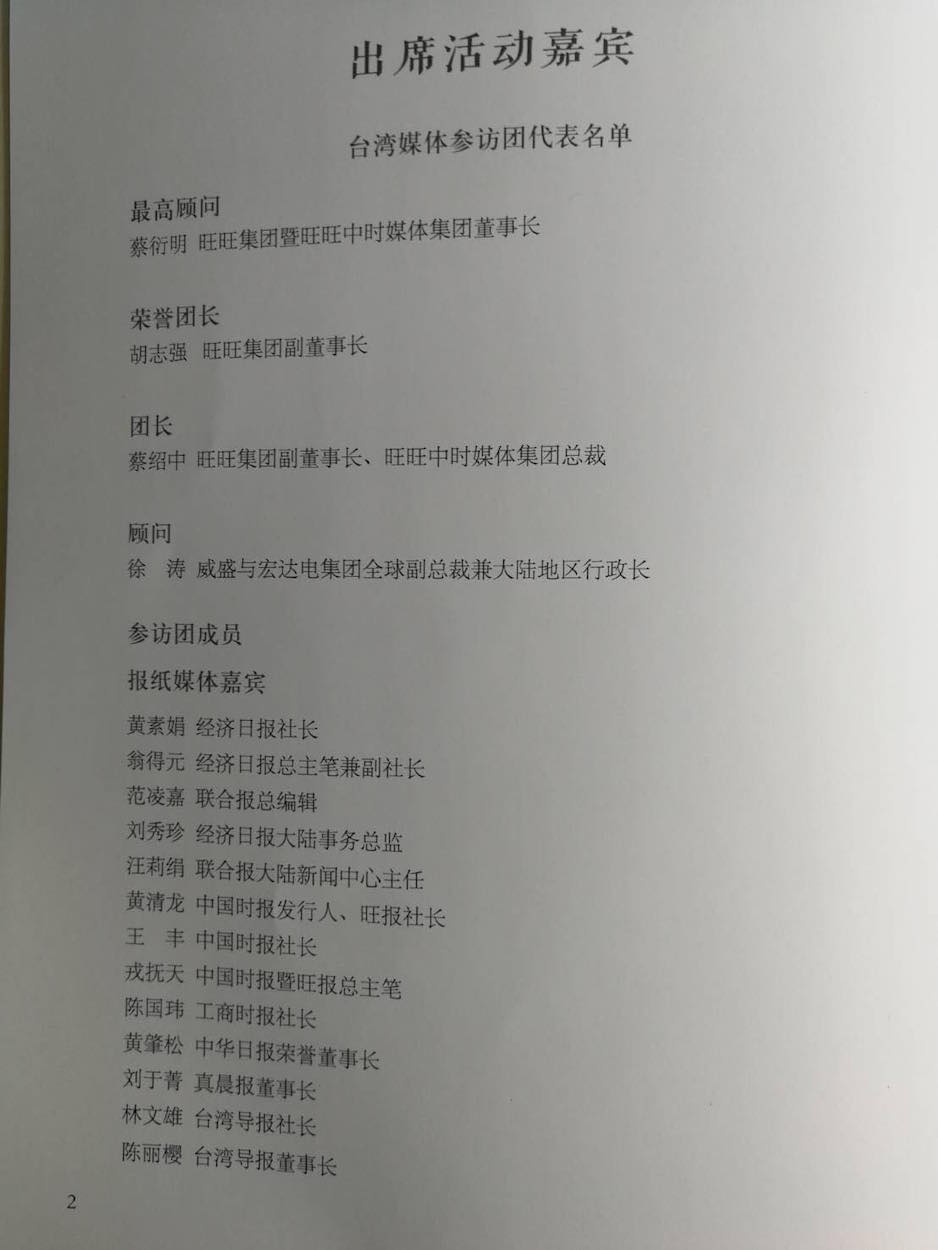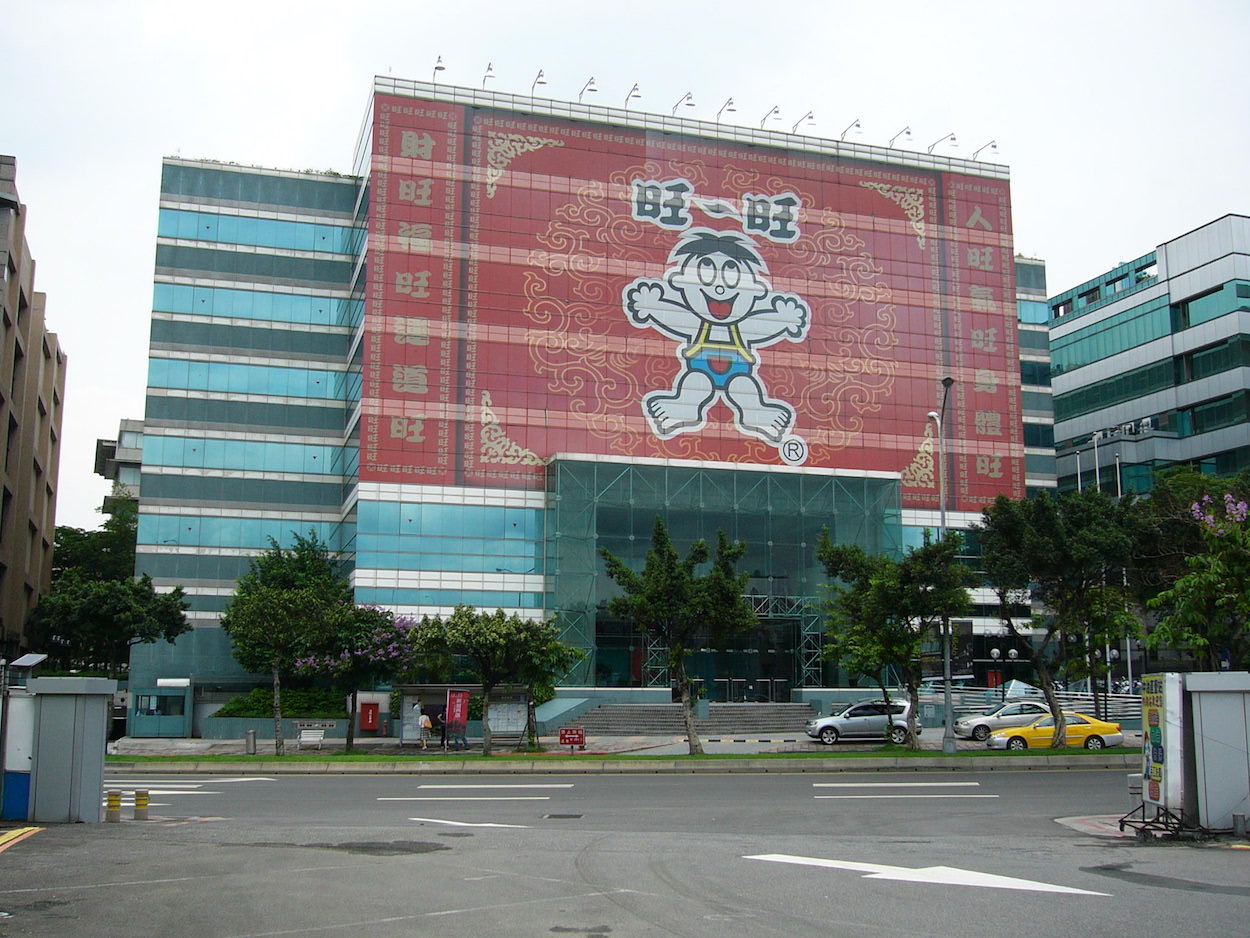by Brian Hioe
語言:
English
Photo Credit: WikiCommons
CONCERNS REGARDING Chinese influence on Taiwanese media have again been raised in the past week through a number of incidents. However, it generally should not surprise that large elements of the Taiwanese media remain firmly beholden to China.
First, as most widely reported on, over 70 representatives from Taiwanese media organizations were present at an event in Beijing earlier this week co-organized by the Beijing Newspaper Group and the Want Want China Times Media Group. The event focused to a great deal on cross-strait relations, with participants urged to aid the political unification of Taiwan and China, and involved participant organizations signing a cooperation agreement.
 Front page of the program at the event listing participants. Photo credit: 林雨蒼/Facebook
Front page of the program at the event listing participants. Photo credit: 林雨蒼/Facebook
Among the Taiwanese participants in the event were high-ranking staff from some of Taiwan’s largest media organizations, including Fan Ling-jia, the editor-in-chief of the United Daily News, Huang Qing-long, the president of Want Daily, Wang Feng, president of the China Times, Chen Hong-jin, chair of the Taiwan Broadcasting Association, Ding Wen-qi, chair of the Taiwan Radio and Television Program Association, and Qiu Jia-yu, the chair of CTV.
Tsai Eng-meng, the chair of the Want Want Group, and former Taichung mayor Jason Hu were also present. Tsai Eng-meng is Taiwan’s second-wealthiest man and Tsai has been open about his aims in acquiring media outlets through his Want Want Group is to facilitate the unification of Taiwan and China by spreading pro-unification views in Taiwan.
High-ranking members of the People’s Daily and Xinhua News were present at the meeting, as was Wang Yang, chairman of the Chinese People’s Political Consultative Conference National Committee. Although comments by Wang were made behind closed doors, his comments were later obtained by Taiwanese media organizations who were not present at the conference, revealing that Wang’s speech attempted to dissuade Taiwanese participants of any guarantees that America would intervene on behalf of Taiwan in the event of a Chinese invasion.
As the media outlets present at the meeting hailed from the pan-Blue camp, with a strong presence by media outlets owned by the Want Want Group, pro-unification views may not surprise. Likewise, members of the pan-Blue camp have long since demonstrated a willingness to go to China to hold public meetings with high-ranking Chinese officials in order to facilitate pro-unification aims, whether these be members of the KMT, members of the pan-Blue media, or retired pan-Blue former military personnel.
Nevertheless, it has been questioned in the past weeks to what extent the Chinese government directly influences Taiwanese media outlets. After being questioned by DPP legislator Luo Chih-cheng during a meeting of the Foreign and National Defense Committee, Deputy Director of the National Security Bureau Chen Wen-fan stated that he had heard of Taiwanese media outlets first seeking approval from China before publishing articles. To this extent, the Apple Daily recently reported that the Want Want Group received over 477 million Chinese yuan—just over 2 billion NTD—from the Chinese government between 2017 and 2018.
 Want Want logo on the side of the China Times Square Building in Neihu. Photo credit: Solomon203/WikiCommons/CC
Want Want logo on the side of the China Times Square Building in Neihu. Photo credit: Solomon203/WikiCommons/CC
Indeed, anger has been on the rise against the Want Want Group-owned CTiNews due to misleading reporting by the outlet aimed at damaging the reputation of the Tsai administration and politically benefit KMT politicians. In many cases, this has taken the form of non-stop coverage of Kaohsiung mayor Han Kuo-yu, with close to sixty percent of its headlines found to be about Han Kuo-yu on some days. CTi has also been criticized for featuring images in programming which depict Taiwan as directly being part of China. However, if the Want Want Group is directly receiving funding from China, or may even be seeking Chinese approval before running stories, this may not surprise.
It has long been rumored that many pan-Blue media outlets directly receive money from China, including the United Daily News, another one of Taiwan’s four largest newspapers. Nevertheless, in many cases, it is hard drawing the line between legitimate donations and investment or direct attempts by the Chinese government to funnel funds into Taiwanese media outlets as a means of propagating pro-unification views. Moreover, China has no shortage of wealthy businessmen willing to act as its proxies in funneling funds toward Taiwanese media outlets.
However, it remains to be seen what actions can be taken to address this issue. While president Tsai Ing-wen and other DPP politicians have been critical of Taiwanese media outlets for compromising freedom of the press in Taiwan and fines have been imposed on CTi for misleading coverage through the National Communications Commission, the Tsai administration would be accused of overstepping its bounds beyond a certain point. And while press organizations such as the Association for Taiwan Journalists have also issued statements citing concern regarding the possibility of media outlets seeking Chinese approval before running stories, in the absence of public pressure, one expects pan-Blue media outlets to continue with their actions.

